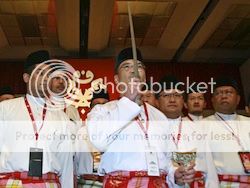Queering Malaysian Malay-Muslim cohesiveness

The sexual activities of Malaysian Muslims are often subjected to surveillance and penalties. Religio-political institutions such as Jabatan Kemajuan Islam Malaysia or Department of Islamic Development Malaysia (JAKIM) in the Federal Territory of Kuala Lumpur are assiduous in stampeding on the private sexual lives of Malay-Muslims, irrespective of heterosexual or homosexual expression. In this regard, sexual subjectivities have become unwitting pawns in political strivings.
Joseph Goh, New Mandala
My recent chapter in Queer Sexualities: Diversifying Queer, Queering Diversity entitled “Malaysian Masculine Exposé: Queering the Politics of Non-Heteronormative Malay-Muslim Men” argues that non-heteronormative Malaysian Malay-Muslim men confront and lay bare political agendas which rely on the heteronormative assemblage of masculinity and sexuality. This assemblage, which has assumed spaces of privilege, converges with, affects and is influenced by issues of religion, ethnicity, patriarchy and citizenship. Insistence on performativities of masculinity and men’s sexuality serve to undergird an imagined “Malay-Muslim cohesiveness.” While “non-heteronormative” refers to a gamut of gender identities and sexual expressions that defies gender and sexual conventions, I use it in reference to men whose lives are incongruous with socio-cultural and religio-political endorsements of masculinity and heterosexuality as essentialised and stable traits. Any variation of or divergence from these definitions is unequivocally excoriated as deviant and/or sinful. In queering the aforementioned political agendas, I challenge the normalisations and uncritical acceptance of these intersecting issues, and foreground the lived experiences of non-heteronormative men. My aim is to expose how the imagined Malay-Muslim cohesiveness belies the real intent of political security and power.
The topic of sexuality is one which continues to be held in great sensitivity among many Malaysians. The sexual activities of Malaysian Muslims are often subjected to surveillance and penalties. Religio-political institutions such as Jabatan Kemajuan Islam Malaysia or Department of Islamic Development Malaysia (JAKIM) in the Federal Territory of Kuala Lumpur are assiduous in stampeding on the private sexual lives of Malay-Muslims, irrespective of heterosexual or homosexual expression. In this regard, sexual subjectivities have become unwitting pawns in political strivings. In my work, I specifically focus on two warring Malaysian political parties – the United Malays National Organisation (UMNO) and Pan-Malaysian Islamic Party (PAS). UMNO’s presence in the ruling coalition of Barisan Nasional or the National Front (BN) is so formidable that its position in the federal government has eclipsed that of other component parties. History has borne witness to how UMNO and PAS have struggled to “out-Islamise” each other in order for one to wrestle moral authority from the other. Additionally, the efforts of UMNO and PAS to out-Islamise each other are also attempts to “out-Malayise” and “out-Malaysianise” each other. Section 160(2) of the Federal Constitution of Malaysia conflates the ethnic identity of a Malay person with the praxis of the Islamic faith, thus constructing the Malaysian-Malay-Muslim triadic identity. This UMNO-PAS crusade is evidently not embarked upon for gratuitous purposes, as the emergent champion of morality commands greater political credibility.
I wish to highlight three particular areas in which the UMNO-PAS rivalry has unfolded. First, both parties engage in mutual vilification by invalidating each other’s “Islamness.” Second, the competition for moral – and by extension, political – legitimacy has materialised in the Malaysian heteropatriarchal and masculine systems of Islamic family laws. In such religio-legal matters, the ruling UMNO/BN-led government clearly favours Malay-Muslim men, as evident in marriage and paternal rights. Third, UMNO and PAS actively foster the vilification of all non-heteronormative persons, including especially non-heteronormative men. I argue that Malaysian men elicit greater religio-political and socio-cultural capital over women, particularly in Muslim societies. While such a disposition may lead to the imaging of women as subservient to men, it is “manness” in male bodied-persons which claims centre stage. Thus, the imagined “Malay-Muslim cohesiveness” that is built on heteronormative masculinity is crucial for UMNO and PAS as they scramble towards religio-political ascendancy. Heteronormative masculinity becomes the metonym for strength, power, uprightness and religiosity. Conversely, non-heteronormative expressions of gender and sexuality are feminised, and perceived as weakness and subjugation. From this perspective, non-heteronormative Malay-Muslim men become entrapped in ideologies that act as collateral for the UMNO/BN-PAS political rivalries.

